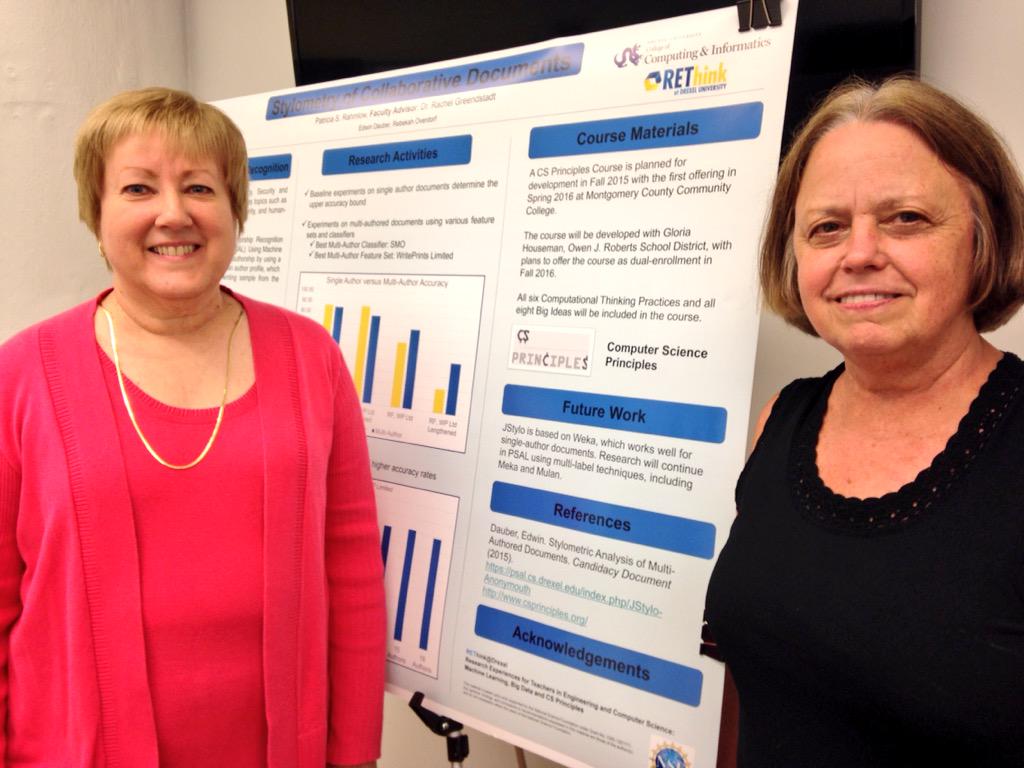Patricia Rahmlow’s been teaching computer science at Montgomery County Community College for nearly two decades, but this summer, she went back to school.
Rahmlow, a youthful and feisty 61-year-old, spent the last seven weeks at Drexel’s Privacy, Security and Automation Lab, researching how software could identify authors of a text. As Rahmlow described it, it’s what English teachers have been doing all these years — reading a student’s paper and being able to tell if it was plagiarized or not. Rahmlow’s project this summer was to figure out how to automate that instinct. (It builds off work that professor Rachel Greenstadt, who runs the lab, and her students have done around identifying and anonymizing authors.)
We want every student in our college to understand the importance of computer science.
Rahmlow is one of a dozen local educators who participated in Drexel’s REThink Program, a sort of summer research camp for STEM teachers at high schools and two-year colleges. Backed by a nearly $500,000 grant from the National Science Foundation, the program tackles the “unthinkable” lack of computer science education in schools, said project lead and Drexel professor Jeff Popyack. It hopes to strengthen local computer science curricula by giving teachers an opportunity to do research alongside professors and grad students. Teachers get a roughly $10,000 stipend for participating, on top of a $2,000 expense account to purchase materials.
REThink is in its third and final grant-funded year, though Drexel plans to reapply for funding, Popyack said.
The teachers talked about their work at the final showcase, held on the third floor of Drexel’s 3401 Market Street building, earlier this month. Jason DeFuria, a biology teacher at Cherry Hill High School East, had done cancer research with medical school professor Mark Zarella, while Omar Ali of Northeast High School and Steven Rood-Ojalvo of South Jersey’s Delran High School worked on how to automate map generation in games with professor Santiago Ontañón.
Another Montgomery County Community College computer science teacher, Kathy Kelly, showed off the eyetracking program she built. She said she’d use what she learned in her web design class — if you’re designing a website, you should know where a user’s eyes go first, she said.
When it was Rahmlow’s turn to present, she spoke of how REThink helps put computer science into context.
“The students are always saying, ‘When I am ever going to use this?'” she said.
Now, she said, she can go back to her classroom at the college’s Blue Bell campus and use these research projects, like the authorship one at the privacy lab, as examples of real-world problems that computer science can solve. It’s especially useful for Rahmlow because she teaches computer science classes for non-computer science majors. The real world connection makes the subject relatable, makes it stick.
“We want every student in our college to understand the importance of computer science,” she said.
The way Rahmlow spoke about the literacy in computer science calls to mind how Penn professor Yasmin Kafai spoke of digital literacy.
“We all have to understand coding like we have to understand reading and writing,” Kafai told NewsWorks’ Kevin McCorry last December. “Very few of us will become writers and write the great book. That’s reserved for a few, but all of us learn how to read and write to express ourselves, to participate. Likewise, I think you need to understand how the things you interact with on the screens are made.”

Omar Ali (left) and Steven Rood-Ojalvo present their work at Drexel’s REThink showcase. (Photo by Juliana Reyes)
One thing that seems like a missed opportunity? Engaging more teachers in the budget-strapped Philadelphia School District.
It’s something Popyack, one of the project leads, thinks about.
“The Philadelphia School District isn’t in a position to offer computer science [classes],” he said.
This is one way Drexel can help. But the teachers in the REThink Program have skewed more toward those who work in the suburbs (though during the first year, the breakdown was half and half, he said). The program gets more applications from suburban teachers, he said. When it comes to Philly School District teachers in REThink, most of them have been from charter schools, like New Foundations Charter School and Freire Charter School.
Popyack said Drexel doesn’t prioritize Philly School District teachers when it comes to the application process. When asked if he would consider it, he said, “You have to be careful with bias,” adding, “but we’re interested in making sure the city is represented.”
Before you go...
Please consider supporting Technical.ly to keep our independent journalism strong. Unlike most business-focused media outlets, we don’t have a paywall. Instead, we count on your personal and organizational support.
Join our growing Slack community
Join 5,000 tech professionals and entrepreneurs in our community Slack today!

The person charged in the UnitedHealthcare CEO shooting had a ton of tech connections

The looming TikTok ban doesn’t strike financial fear into the hearts of creators — it’s community they’re worried about

Where are the country’s most vibrant tech and startup communities?


